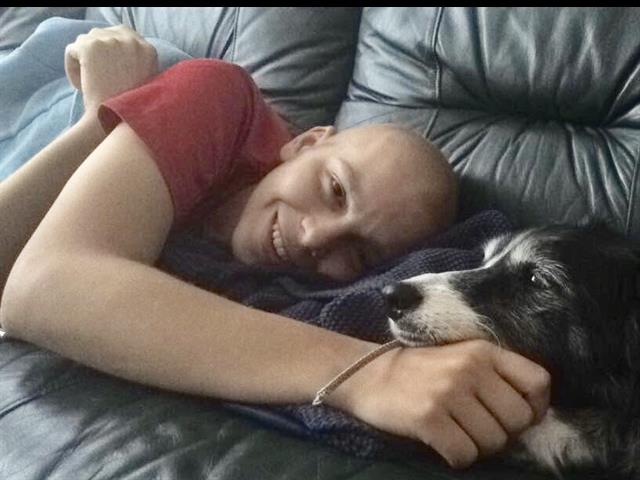Patrick Wilson was only 18 years old when he received his cancer diagnosis. Just like any other teen his age, he was in school, loved sports and looked forward to the future when his world drastically changed.

“I knew something was up, but I didn’t know what. I will never be able to replicate that feeling of being in the hospital and being told it looks like a large tumour,” Wilson told Global News.
He said he felt “shocked and scared” and knew nothing about cancer at the time. And then came the chemotherapy and radiation.
“Lost my hair, lost weight, points of extreme pain in which I was hospitalized. There were points when my white blood counts were zero. I was hospitalized with a fever of [41 C] at one point,” Wilson said.
It was March 2016 when the teen received the fateful news. Doctors diagnosed Wilson with Stage 4 embryonal rhabdomyosarcoma – or RMS, which had a 20 to 50 per cent chance of survival.
Embryonal rhabdomyosarcoma is a malignant soft tissue tumour that’s formed from embryonic skeletal muscle tissue. In most cases, it’s a quickly growing tumour that causes noticeable symptoms.
Rare sarcomas, like Wilson’s diagnosis, are incredibly infrequent. Sarcomas represent less than one per cent of adult malignancies, and from this one per cent, there are more than 50 subtypes, according to Dr. Abha Gupta, an oncologist at Princess Margaret.
Databases and tissue banks are crucial in helping doctors, specialists and families determine the best course of action for treatment and predicting the trajectory of disease.
But they don’t exist at all for rare cancers, leaving oncologists and their patients to figure out a plan on their own.
“Tissue banks and research support are the crux to improving our understanding of any cancer – rare or common. The reason why so much is known about lung or breast cancer, for example, is because so many people have it, there are so many specimens available, and a lot of money to analyze those specimens,” Gupta told Global News.

(Photo courtesy Patrick Wilson)
Each time doctors took biopsies, blood tests and other samples from Wilson, none of the specimens were kept on hand.
“It didn’t make sense to me why they wouldn’t bank it,” he told Global News.
That’s when he learned there were no pre-existing tissue banks for rare cancers in Canada.
So the 20-year-old and his family decided to start their own: the Wilson Sarcoma Research Fund, which would create a global database of tissue samples. It’d be a game-changer in facilitating research to help patients with rare cancers and, hopefully, finding a cure. The fund was conceived in December 2016 and officially set up in April 2017, with over $275,000 of seed money from the Wilson family.
Wilson is attempting to raise $1 million within five years for the research fund, starting with collaborations with universities across Canada. The funds will go toward establishing the database out of Toronto’s Princess Margaret Hospital.
At the hospital’s latest Journey to Conquer Cancer Walk, Wilson raised $63,000 alone.
READ MORE: What one non-smoking young mom diagnosed with lung cancer wants Canadians to know
The initiative is being led by Gupta, too.
“I want to know every single Canadian who is affected by a rare sarcoma. I want to ensure that their stories and tumour tissue are captured and not lost in history. I want to help cure more Canadians,” Gupta said.
The global database would also connect specialists with academics, doctors and patients around the world to exchange information, according to Dr. Elaine Chin, chief wellness officer at Telus Health.
The hope is that the funding will make sure patients with rare cancers could have their tissues banked and analyzed while their clinical courses are documented and evaluated. Over time, the data would make some headway into understanding rare cancers, especially in young adults.
Wilson’s rhabdomyosarcoma, for example, tends to afflict young adults, presenting in childhood. But in Wilson’s case, he was a growing teen. His red flag was when he felt pain when he’d urinate.
Wilson was at Florida Southern College studying finance and economics at the time. He went to the hospital while on spring break just in case something was wrong.
READ MORE: Nearly 1 in 2 Canadians expected to get cancer. Here’s why
By early April 2016, he started treatments in Canada: he had radiation every weekday for a month followed by chemotherapy once every three weeks for 46 weeks.
“Basically, the deeper you go into chemo, the worse it gets. So at the start, it wasn’t bad but it gets worse and worse. At the end, you feel like crap the whole time, and then you go for another round,” Wilson explained.
“It was just a lot of pain.”

(Photo courtesy Patrick Wilson)
But he pushed through and even managed to keep working on his post-secondary career. By April 2017, doctors declared Wilson cancer-free.
There’s still a 50 per cent chance of recurrence so Wilson has to go for scans every three months.
He’s on the mend, though: this summer, he’s a water ski instructor and even competing in water ski competitions.
In August, he’s returning to Florida to continue his studies, too.
READ MORE: Cancer cases slated to climb 40 per cent by 2030, Canadian report warns
And he’s throwing his efforts into raising funds and awareness about rare cancers and their need for research and development.
“Because it’s such a rare form of cancer, it doesn’t get the funding that other larger cancers get. We knew we could make a difference, to help other people who might be going through the same thing as me,” Wilson said.
“Every disease needs a champion. A leader and an innovator,” Gupta said.
Gupta believes Wilson is stepping up to take up the challenge.
“He can do it. He can make it happen,” Gupta said.
To donate to the Wilson Sarcoma Research Fund, visit Patrick’s Journey to Conquer Cancer page.
carmen.chai@globalnews.ca
Follow @Carmen_Chai







Comments